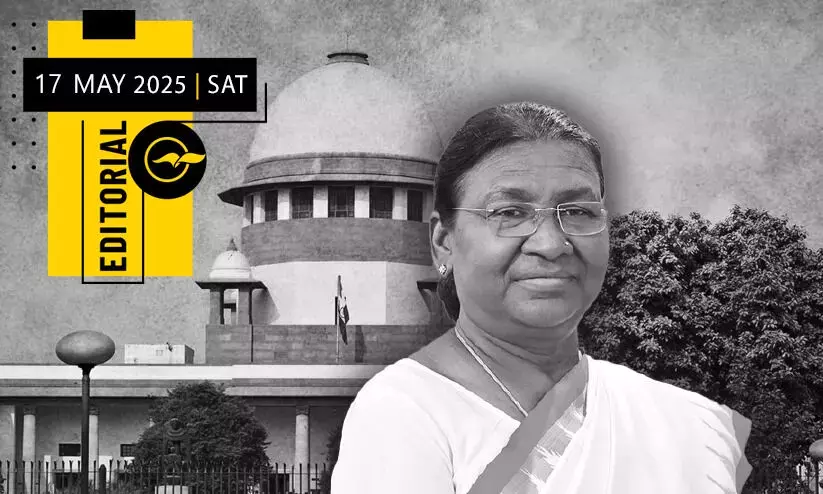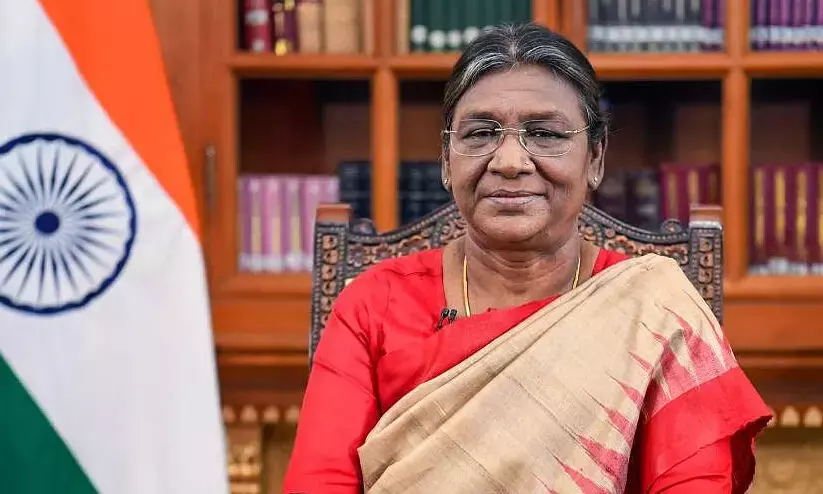
Constitutional values and the President's questions
text_fieldsFrom the very first day of governance, Narendra Modi and his group have made various efforts to bring opposition-led states that do not comply with the central government's decisions into trouble. This has included economic blockades such as withholding central funds from non-BJP-ruled states, imposing tax restrictions, and creating financial hurdles. Another visible trend is interference by governors in the functioning of state governments, often disrupting governance processes unnecessarily. Both these interventions are inherently coercive, frequently forcing state governments into submission under central agendas. In Kerala, under Governor Arif Mohammed Khan, several such interventions have illuminated governance challenges. His refusal to approve the policy speech in the legislative assembly, prolonged delays in granting assent to bills passed by the state government, and multiple instances of parallel governance from Raj Bhavan showcase this pattern. This trend is not limited to Kerala alone; it has also been visible in Tamil Nadu, Punjab, West Bengal, Telangana, Karnataka, and even Maharashtra during Uddhav Thackeray's tenure. In all these states, governors have frequently blocked bills passed by the legislative assemblies indefinitely or returned them without approval. In Tamil Nadu, Governor R.N. Ravi withheld ten bills passed by the state government, leading to a legal challenge in the Supreme Court. On April 8, a bench comprising Justices J.B. Pardiwala and R. Mahadevan not only criticised the governor’s actions in strong terms but also directed an urgent decision on the pending bills. Furthermore, the court cited the Constitution to emphasise the necessity of timely decisions on legislative bills. This intervention marked one of the strongest judicial responses against the central government's use of governors to obstruct state governance. However, the key question now is whether the Supreme Court can intervene further. President Droupadi Murmu has sought the court’s opinion on this matter by submitting 14 specific questions under her special authority.
The President has sought the Supreme Court's opinion under Article 143(1) of the Constitution, which allows the President to request judicial advice on matters of public importance and legal issues. In the history of independent India, this constitutional provision has been invoked only 14 times before, primarily in cases involving complex legal disputes or federal governance concerns. Notable instances include the Kerala Education Bill of 1958, the Cauvery River water dispute of 1992, and the judicial proceedings following the Babri Masjid demolition. The fact that this provision is being used again—merely in response to a directive or warning from the Supreme Court—is intriguing. The court's intervention was specifically aimed at the Tamil Nadu governor’s stance. Naturally, it was expected that either the governor or his office would file a review petition. If that failed, a curative petition would still have been an option. However, the President directly intervening in this issue is highly unusual. Legal experts like Kapil Sibal have observed that this move appears to be politically motivated. The President’s 14 questions are based on Articles 200 and 201 of the Constitution. Symbolically, these questions cannot be dismissed easily. Firstly, the Supreme Court’s directive does not specify a time limit for approving bills; this falls within the discretionary powers of both the Governor and the President. Another relevant question is whether Article 142 of the Constitution—which grants special authority to the Supreme Court—contradicts similar constitutional provisions governing other institutions. However, the core issue is that the President has not taken into account the circumstances under which the Supreme Court intervened in this matter. Alongside Tamil Nadu’s petition, states like Kerala, West Bengal, and Telangana have also approached the Court with similar legal challenges. In Kerala’s case, the Supreme Court is set to decide on 11 bills, including four that were blocked by the President. In West Bengal, seven bills have been withheld, while Karnataka has seen 13 bills stalled. In other words, the discretionary power of Governors has seemingly shifted towards excessive authority, prompting the Supreme Court to issue strict directives. Essentially, beyond the symbolic aspects of the Constitution, the Court’s historic intervention has upheld its fundamental principles and values. Therefore, the questions raised by the President must now be seen as a challenge to constitutional values. How the Supreme Court responds to these questions remains to be seen. If the matter is referred to a Constitution Bench, it could lead to extensive legal proceedings. Otherwise, the Court may choose to step back, as it did in the Babri Masjid case. Regardless, the nation is closely watching whether the President is now following the same path as the Governors, whose actions have been scrutinised over the past decade.



















